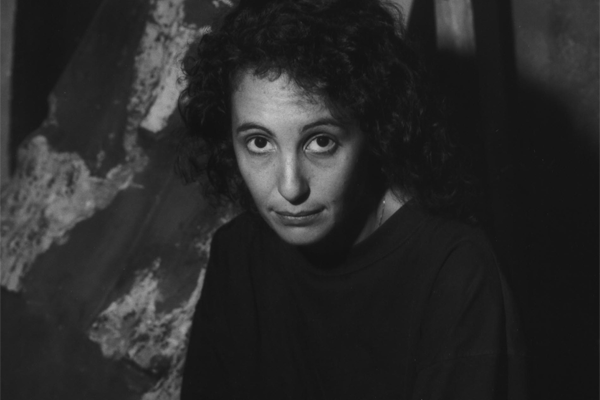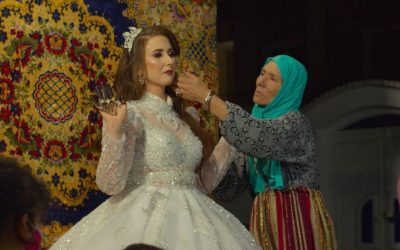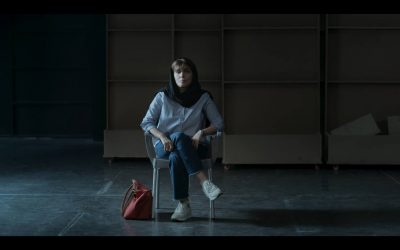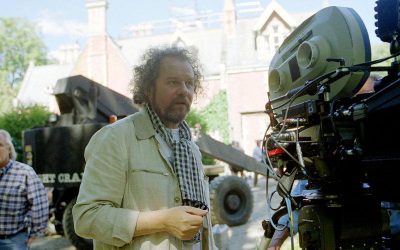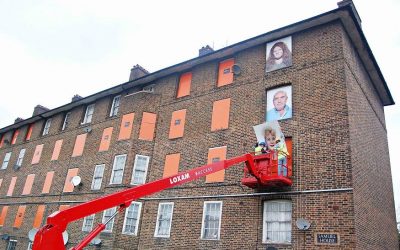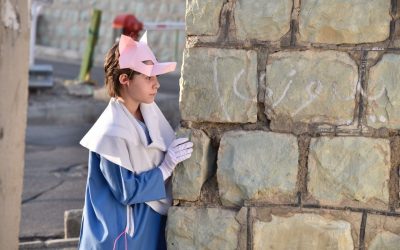Egyptian filmmaker Nadia Kamel was born in 1961 in Cairo, where she continues to live and work. The daughter of journalist parents with a long history of political activism, Kamel grew up in a house steeped in progressive politics and a passion for the arts and popular culture. She studied microbiology and chemistry before turning her full attention to her life-long romance with the cinema in 1990. Working as an assistant director to leading independent filmmakers in contemporary Egypt including Atteyat El-Abnoudy, Youssef Chahine, and Yousri Nassrallah, Kamel has considerable experience in the making of both documentary and feature films. When Kamel first began to work on her own projects in 2000, she found that a saturated production scene left little space for new directors and unconventional topics. Eventually, she concluded that in addressing the daring, often taboo topics, confined to the margins of conventional Egyptian discourse that she hoped to engage with in her projects, she would need to take the risk of producing her own low-budget films. SALATA BALADI (AN EGYPTIAN SALAD), her first film, has been produced in this spirit of indomitable independence. After nearly five years of working solo, she was joined by co-producers Films d’Ici and Ventura Films in the post-production of this family tale celebrating a century of Egyptian cosmopolitanism.
Director’s Note:
“It struck me that our history is contained in the homes we live in, that we are shaped by the ability of these simple structures to resist being defiled.” (Achmat Dangor, Kafka’s Curse). The original inspiration for this film was simple enough: a love for my family’s stories and a wish to share them. It was a storytelling project. The energy that eventually propelled me into this adventure was more complicated. I saw my octogenarian mother aging and my 10-year-old nephew growing up under a shadow of satellite dishes and a rising clamor about some inevitable clash of civilizations. And a mixture of hope and fear overtook me. My mother’s stories, woven across the 20th century, confound any straightforward understanding of the historical events during which they were played out and are almost always an exception to the reductive homogeneity with which we are taught to view ‘History.’ In my family, religions, and cultures get married when they appear to be divorcing in the global arena. In a world where my family’s identities are being squeezed into irreconcilable positions, I needed to document my history before I became apologetic about it and the myth of its extinction was realized. But as my mother told her stories, I discovered that the film could not simply be a reclaiming of our treasured past: we found ourselves colliding with pockets of denial and silence. Without confronting the taboos of our present, my mother’s stories were reduced to self-indulgence and nostalgia. And so my storytelling film became a witness to a new story still in the making – a story about my family’s efforts to once more climb the wall that unjustly insists on separating our principles from our humanity.
RedCut: I believe we are the continuation of our historical memory, and our bodies hold a knowledge that is a mixture of historical awareness and unawareness. In a way, we are the continuation of our ancestors. That’s why we explore the past and our family’s historical memories. In the film “Years Above,” we see a child from the second generation of a family, and the child’s relationship with the past reminds us that without knowledge of the past, the future is impossible. Or, in a way, an illusion of the past can complicate the future. What was your goal in connecting these two generations?
Nadia: So, I think I realized at some point that there was a rupture between the past and the future as you say. Because of many things, all coming from the societal rupture that took place in the eighties – I found myself standing at the edge of a memory cliff – the story stops with me. My parents were able to immerse me in the human proximity and culture, the sociopolitical life and I in my own right could watch the transformation of this society and the erasure of any palpable trace of a very rich and complex past. I realized this is not about natural progress and change that happen but in the form of trauma, sorting people and kicking them out, demolishing buildings and furniture that carry the memories like dream catchers. In that way I realized that Nabil my nephew and grandchild of my mother, a woman with a very complex and rich culture, ancestors, and histories, Nabell will be subjected to lots of bla bla about the past – but in real everyday life, he will be at the mercy of a synthesized life. One day I realized even the food we eat has disappeared – I found myself telling him about an entrecote steak – telling him in the end “But this is not possible to taste anymore because it might not be safe” – that was during the mad cow disease. It was like a light bulb in my head… Nabeel won’t be able to understand anything and he will find himself making assessments based on ignorance, obliterated images, and tales put in contradiction with one another. I want to make a film about all these wiped-out memories and the possibility to taste and build his own culture. But I was not able to make my own movie, it was clear that there was sort of a ban on creative ideas, creative independent production, and unclassified films at the conception. I asked my mother to work together away from the police, the film industry, and social censorship. Here was the surprise, she was ready to dive in immediately, she had so much to contribute to rescue Nabeel’s memory and first-hand experience. We took him around to get to know everyone and we told him what his age did not allow him to receive in hopes that in time his own childish experience with this film will get him to want more and explore more. Another surprise, Nabeel himself was ready to ask questions and be part of the film – he was avid for details of what he sensed was present in the big shadow of displacement, erasure, and censorship. So that was my role to embark on an impossible project to give Nabeel a thread – a very thin thread to link him to himself in the past.
RedCut : We know that the discovery of facts by a camera is usually a form of police surveillance. With the camera, we try to reveal facts that the ruling system, family powers, and taboos tend to delete. Did the camera’s role in this film help you uncover hidden truths in the family members? In a way, was the camera an unbiased witness?
Nadia: Authorities’ use of the camera to reveal what individuals or communities tend to hide from its sight, is only equaled by an individual’s will to reveal what authorities tend to erase to keep people from connecting with themselves. My camera in this film was dedicated completely to stories erased by the myth of purity and consensus and to giving space to any individual expression, charisma that radiates away from the collective seemingly seamless narrative. In that sense yes my camera gave the possibility for individual dissonance. I don’t believe in an unbiased camera but I do believe in a camera that gives time and space for individuals, through lengthy interviews and lengthy shots allowing for other ways of expression than words, eye language, facial expressions, silences, and body language. Finally editing the footage in the same way – no short shots, no short sentences – always allowing for the footage to speak for itself – also giving me space to share my path, contemplation, and surprises, keeping room for the audience to contemplate with me, have doubts and discuss them with me. The camera shared my doubts too. The experience was full of surprises – for the ones who kept themselves from the knowledge and for the ones who knew much more, personalized surprises for everyone who made, contributed, or watched the film, from the family, friends, or anonymous audience.
RedCut: How do you interpret the relationship between your biological geography and your political history? Geography defines the body and history. How do you define the relationship between your memories and geography? Does the camera play a role in connecting these lost spaces?
Nadia: This a very interesting question that I started answering at the end of the preceding answer. When I embarked on this adventure, I was full of hope to connect with Nabeel and give him a way of exploring life in confrontation with a didactic socio-political atmosphere. I wanted to be true to this way of life I was brought up with and that meant so much to me and rescued me from insisting on reaching final conclusions. A way of exploring that factored in the very dynamic nature of life, so even if something “was” very true – it might have changed by the time I am filming. Let alone that in any case, I had to unlearn a lot of things during my life. So I want to be true to my ambition of contemplation, search contemplates – understand complexities, expect them and explore more – try to never stop contemplating what we already know, try to never stop researching more, and especially never hide away from complexity, especially disturbing ones. So it was essential for me not to tell a story that I know to someone (Nabeel) who doesn’t know… the intention from the beginning was to receive a film snorkeling with the camera into what I don’t understand but also expecting to discover and not looking away when surprised in a familiar place or people. Geography is also a factor of time, the same geography is a moment in time – the same geography has a different impact and yes the camera was avid to be surprised and challenged even in the most familiar places and the most familiar memories.
RedCut: Space and place have an important relationship with politics. Places change their meaning and shape from their original state to a new one, based on their political history and what happened to them in the past. How do you see the relationship between politics and place?
Nadia: Egypt is a place – but a moment in history is a river that doesn’t stop changing and our perception of what the past was when it was in the present is an ocean. Right now I am working on this perception. A group of young free artists in Egypt works with me on the perception of the 70s and 80s in what I perceive in our present and theirs… It’s amazing. Politics and the political scene are two different things – it’s like the difference between films and ads. But I think that a lot of my previous paragraphs answer this question too.
RedCut : Salata Baladi is a real-life home-video documentary about the diverse and multifaceted home(s) seen in Egyptian cultures, as well as the cultural clashes that are part of that mix. What instigated the need for making this video was an imam’s Eid sermon, which basically stated that diversity was not possible—namely, that Muslims should “awaken to defend Islam against its enemies who seek to erase it from the face of the Earth.” Kamel’s very young nephew Nabeel listens to such discourse, which the filmmaker considers heartbreaking for her and the future generation of Egyptians. Therefore, she created this documentary in response to this statement, to let her nephew and his peers know how much more diverse the state of Egypt once was. Nadia, as well as her mother Mary, describes and engages in a conversation that reveals family stories that sometimes are quite painful to hear. Both Kamel and her mother feel that it is important to make known to Nabeel what his family roots are and … I want to know how Trauma therapy was for the family on this important journey through the camera?
Nadia: It was indeed a form of trauma therapy, although I initially wasn’t fully aware of the therapeutic potential when I began. My aim was to connect with Nabeel and my mother. With my mother, I had a deeply ingrained bond that was on the verge of being shattered by the harsh reality of perpetual defeat. Our worldview was being suffocated, and we disagreed significantly on how to navigate the situation. Two women, vastly different in age, traversing distinct stages of life – she couldn’t help but mother me, while I couldn’t cease fighting for my future and my individual existence.
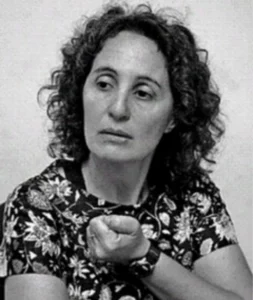
Nadia Kamel Egyptian filmmaker
Nabeel represented potential hope and the inheritor and victim of the magnificent human experience that defined my family for a century. My father, lost in depression, was a mere shadow of himself – devoid of wit, humor, and sharpness. My sister, engulfed in despair, attempted to fit into a dark, rigid, stifling society, struggling to conform and losing herself in impossible choices. However, over the five years of filming, a transformative journey unfolded within me and my mother. It transcended the mere act of sharing stories and occasional warm encounters with our family’s diaspora; it became a comforting, reassuring exercise in mutual understanding and a tacit alliance to embrace risk. My mother evolved into the driving force behind the adventure of her life, finding her voice and touching Nabeel with her magic. Astonishingly, my father, the dormant mountain, stirred. A spark ignited in his eyes, as if he had found meaning through this audacious leap. He reclaimed his perceptive self, offering wisdom in the most rebellious manner and injecting humor into the gravest moments, rescuing us from dullness. His presence during our journeys, his comprehension of our mission, and his decision to join us in the leap were quintessentially him. I dare say that when he chose to support my mother in her daring project, he wasn’t merely supporting her – he was rediscovering his true self, a pioneer in politics and society. He grasped that refraining from being mischievous alongside us would be a rupture in his legacy and personality. He yearned to reclaim his tradition of rebellion and dissent. After the film, amidst the significant controversy it stirred and the space for debate it carved in a society that had denied differences for three decades, you can picture my parents in the limelight of pioneering dissent – happy, radiant, and prepared for the good fight. Even my sister, initially shaky but brave in the eye of the storm, took a few years but eventually emerged proud and content to belong to this resilient nuclear family. Nabeel’s journey is also transformative, albeit with its own complexities. It was, to say the least, a therapeutic experience.
RedCut: Andrea wrote about the film Salata Baladi explores multiple identities that cannot be separated or divided by borders and politics. It is so full of love and the complicated expression of it necessary when politics enter spaces of kinship. It is a film that proposes an idea of family and belonging as a reminder of the brutal reality of geopolitics and does not turn its gaze away from the hardships imposed on those who have been displaced from their homeland. It lets the complexities of these lives manifest. I completely agree with her opinion. What do you think about it?
Nadia: I fully agree that I did not find any obligation to choose a side in a conflict that was created and maintained by geopolitics. On the contrary, I felt compelled and attracted by the challenge to deconstruct the adopted narratives about religions, geopolitical conflicts, and competition between the Jewish tragedies and Palestinian ones, or the license this or that gives to turn a cold shoulder to injustice, etc. At the same time, it is not that complicated to see that there is an aggressor side in the name of the Jewish religion and that at this point in time and since the conception of the idea of the nation-state based on Jewishness was the foolish unjust idea that has let to great continuing injustices and that the Jewish people have suffered in another point or points in time does not license the crime of displacing by all means a whole population of Palestinian and maintaining an apartheid rule towards the Palestinians. I also think that the Jewish people are suffering from this aggressor’s role in its own name. I think colonialism hurts the colonized people but also its own people. I had watched a very deep contemplation of the complexity and the ugliness of the situation in Palestine, which was “route 181” of Eyal Sivan and Michel Khleifi. And I was touched to find that I was not alone to think that Jews are causing a lot of suffering to the Palestinians until today – and that they are unwittingly causing a lot of suffering to their own people. But this is the fate of aggressor populations. And it happened before and could continue happening for a long time – but this reality cannot be a cynical conclusion, let’s just accept – Jews are no exception they can do horrors like any other population – there is no gain to humanity in accepting Jews from accountability. Anyway, I hate speaking of politics because this denial of justice is leading to complications and deformations of every sort in the region. And no one is comfortable or happy as a result of this suggests that the creation of a state based on religious sorting is going to be a good thing. I hate the politics bla bla in it because it is extremely manipulative, the question is not just a geopolitical misunderstanding between two populations otherwise extremely alike and kind – but it is also the festering wound of a prolonged injustice and denial of one’s own role in it.
RedCut: I read the article about your film: “This film depicts the awakening of long-pent-up sentiments; it is a humanitarian message for members of all religions.” This is how director Nadia Kamel described her long documentary drama Salata Baladi. The name is in itself indicative. Baladi salad—a mix of diced cucumber, tomato, lettuce, green pepper, radish, watercress, dill, and any other fresh salad vegetables in season, topped with onion—is a staple dish on Egyptian tables. The words ‘Baladi salad’ are, however, commonly used to indicate any random mixture of things or events. The film depicts the yearning of members of a large family who all belong to different nationalities and who had met and intermarried in the cosmopolitan Egypt of the 1920s, 30s, and 40s, but was later separated by the wars and enmities of the region, to again unite. The film was awarded a prize at the Arab Film Festival of 2007. Can you let me know more about it? I really like the idea of food because sometimes food shows us the culture, what do you think about it?
Nadia:I meant the title in a positive good way, a mixture of fresh colorful seasonal homegrown people, and what a disaster it was to deny their possibility – the working title started with “home” but then it was clear to me that just “home” was reductive – in this “home” there was so much variety it was like in this home was hiding a jini – the diversity of the food in our house was a source of a lot of happiness and then I thought this is a big salad, etc until it suddenly came to me we are a salata baladi meaning local Egyptian but so diverse. But some people who were critical of the film found the title offensive as if I meant untidy and garble – we are not a pure breed you see? And they were annoyed that Egyptians and Palestinians were dragged into this bastardized mix – at the time there was a lot of veneration of purity – and a lot of people thought in a fundamentalist way. Today the general vibe is less rigid and more diverse also – Egypt has become a big salata baladi of ideas and views (and a huge genetic pool for centuries)
RedCut: You are working on a Low Budget Project. What is the relationship between art film and the documentary industry?
Nidia: I think there are artists working in the despotic system of the industry. But art film and documentary have nothing to do with industry – there shouldn’t be any industry involved – there are so many filmmaking recipes that we think come from drama requirements and they are not, they are simply imposed by production efficiency. For example, you have to have an idea then research then write a synopsis then a treatment then a script then when the money is completely gathered we produce the film: the script is dismantled into lists of requirements for shooting, etc – even in the documentary you have to prepare so much in a certain order – I think this is just one way to produce – the industrial way – I am in the middle of an experiment to produce low budget hybrid art/documentary – writing shooting archiving looking for money, etc. I hope I succeed in producing the film I dream of this way – not just until I find enough money and then go to the linear order.
RedCut: What do you think about Palistain now?
Nadia: So hard to write or speak in words about Palestine in the light of the ongoing nightmare – I feel robbed of my words in the complexity/intensity of my feelings/thoughts. One or two ideas are still there. I believe in the right of refugees to seek refuge, security and build a new life. This essential right cannot be a moral justification of acts of dispossession, displacement, colonization and subjugation of another population. I also believe it boomerangs in so many ways, so it’s not even practical. The other thing that is clear to me is that history does not start on October 7th 2023, nor does it end with the current carnage in Gaza – History doesn’t start with the creation of Hamas, in the late 80s, nor does it end with it. There is no final knockout punch or victory by points> It is not a boxing game or a cockfight. This is not a game. The mentality of final cruel solution for complex social realities did not start with Hitler, it is an old age mentality – and it is still a way of thinking especially with people in command and control. The prohibitive sensitivity towards the term “final solution” coined by Hitler, I am afraid, is only blinding us from the mentality itself, making us more vulnerable to its poison rather than protecting us from repeats. But I am robbed of words and spend my time trying to find a couple of words to ask about my friends in Gaza – how are you?? Are you still alive?? My heart and thoughts are with you?? Good morning?? How was the night??, and to friends that are not in Gaza… ‘it is horrible?? Cannot believe it?? This is catastrophic?? Nightmarish?? What can we do?? I hear the hollow sound of meaninglessness. So, I am silenced. I barely manage to get info and give support to my friends in Gaza, then in Palestine then in Israel or all over the world – because we are diaspor-ized/exiled/globalized out, aren’t we? I remember a conversation with one of my Israeli/Jewish relatives, after our brief but intense family reunion in 2004 – the conversation took place in 2006, I asked him in earnest, “what is the plan? You are forcing subjugation, inequality, expropriation and dehumanization on the Palestinian people, because your state is obviously stronger in so many ways, and can brutalize non-stop. You get frustrated every time this wrangling proves unsuccessful. What is the hoped-for outcome of such an ongoing supremacist attitude?” I cannot forget how swiftly he answered me – “‘THIS’ will definitely go on until Palestinians accept with gratitude what we are offering them” – I was silenced – and then came up with “And you genuinely believe that this is achievable?” He answered “yes – it is actually happening but they are in denial”. He was clearly under the impression to be on the verge of the final blow. I will spare you the details of such a vicious argument about history and its lessons – I am only remembering that that conversation took place in 2006. We are now in 2023 not anywhere near his suggested outcome. 2006: Nowhere in the middle of vast stretches of subjugation between the creation of the state of Israel at the UN in extremely political maneuvering in 1947 that the operation matateh (broom) was in 1948. With no end in sight. But there is a bitter/sweet silver lining – the shocking cruelty of the ongoing events has revealed a palpable avidity to understand beyond the tabloid prepackaged narrative Israel-old narratives about Israel’s right of self-defense and Arab chauvinism and Islamist terrorism.
Since I am robbed of my words, I borrowed a few quotes from people who are preserving their humanity and digging for a meaning that speaks to the intelligence of the human being in each individual. I am grateful to them and to those who are reading them, and many others. They made me feel less lonely, and I still have hope. A few selected paragraphs from their brilliant humanistic composure in a time when shit hit the fan. In a few days Israelis went through what Palestinians have experienced as a matter of routine for decades, and are still experiencing – military incursions , death, cruelty, slain children, bodies piled up in the road, siege, fear, anxiety over loved ones, captivity, being targets of vengeance, indiscriminate lethal fire at both those involved in the fighting (soldiers) and the uninvolved (civilians), a position of inferiority, destruction of buildings, ruined holidays or celebrations, weakness and helplessness in the face of all-powerful armed men, and searing humiliation. Therefore, this must be said once again – We Told You So. Ongoing oppression and injustice explode at unexpected times and places. Bloodshed knows no borders. Amira Haas – Haaretz – Arriving again at the cycle of vengeance October 10, 2023. And what if it is morally imperative to extend our condemnation to crimes just as appalling as the ones repeatedly foregrounded by the media? When and where does our condemnation begin and end? Do we not need a critical and informed assessment of the situation to accompany moral and political condemnation, without fearing that to become knowledgeable will turn us, in the eyes of others, into moral failures complicitous in hideous crimes? Judith Butler – The compass of mourning – 19 October 2023 (Violence and condemnation of violence) A highly divided disaster – as usual. We learn the same lesson over and over again. In highly unequal societies with deep injustices reliably tracing racial fault lines, disasters don’t bring us all together in one fuzzy human family. They take pre-existing divides and deepen them further, so the people who are already getting most screwed over before the disaster, get extra doses of pain during and after. Naomi Klein, On Fire, the case for the green new deal. 2019. The following are excerpts, a little bit long because they come from a literary essay – a meditational piece that I would like everyone to read. I am terrified to think that the steady snail-pace of pro-Palestinian solidarity in the US has not recognized how largely it has leaned on the near absolute condition of Palestinian suffering. As long as Palestinians are the sole recipients of death, dying, and wretched life, solidarity with them gains in legitimacy. Any disruption in this balance—which never alters the Palestinians as the landslide majority owners of misery—must be attacked, contained, belittled with moral superiority by allies who had not said much of anything previously about Israel’s decades-long atrocities. When will you begin to truly listen to what Palestinians have been saying for decades? I am terrified that so many never asked themselves the basic question: do I really believe that Palestinian lives are equal to Jewish lives? For too many, the answer is a resounding No. But they are neither asked this question nor challenged on it. Instead, they are the ones in charge of asking questions. They hide behind the unbearable size of events, interrogate Palestinian ethics, teach Palestinians how they, too, have become pathologies. Examination of why this is the case should lead only to one question: will you now declare that Palestinian lives are equal to Jewish lives? Try it on for size. What matters more? The number of Palestinian dead or the number of Palestinians who will endure a life worse than death after the Israeli desire for carnage is stated? The former question captivates and deceives us with the mathematics of permissibility—a math we have been indoctrinated in over the decades of American hegemony. Empathy math. If the aim, for example, is twenty thousand Palestinians killed before we decide that this is the threshold of the unacceptable, then it makes sense for the US and Israel to doubt the number of Palestinians they kill, a delay tactic that allows the civilized war machine to get the job done. But I have a more daring question. The Israeli people at large, the Jewish communities outside Israel that identify strongly or faintly, defensively or hawkishly with Israel, the mainstream Western world, and all expressions of Zionism, what do they want from Palestinians? In the best-case scenario, I do not think they really know. I am terrified to think that this relentless progression of dispossession and carnage against the Palestinians has reached irreversible, irrational levels. In my dark hours, which increase by the year, I wonder if Israel is unable to examine or defuse its impulse to test the limits of genocide against the Palestinians—because it has not been able to process the genocide that the Nazis committed against the Jewish people. A genocide that was made possible by centuries of European antisemitism, pogroms, silence, and looking away. If this is the path we are on, what then, as this path reaches its fulminant stage? Aren’t we there yet? The Palestinians do not need to fully identify, in the flesh, with the Jewish experience of genocide. Israel does not need to experience the completion of a genocide on another people to truly forgive Europeans for what they have done to the Jewish people. As Darwish said… Will it be enough or will Palestinians continue to suffer further comparisons on the grand scale of suffering, further analysis of their deficient, impure victimhood? Or is all this really about Zionism’s imperfect victimhood? What genocide isn’t enough? There are countless Jewish people in whom the love and light of the divine lives easily, openly, and they neither want such a catastrophe to befall anyone or, least of all, stain the Jewish memory. What makes a state obsess over its desire to totally dominate a whole people, to own their bodies between servility and expulsion? What makes an overwhelming majority of a people consign another to oblivion, cut them off from the outside world for decades, mutilate their image and their being into superfluous nonbeings? What people obsess over serving other people from their olive trees? How deadly are the olives? How did Israel get here? How different was the beginning? It is time you ask this question without blaming the Palestinians. Look inward, deeply, kindly, in true mirrors, and win back your heart. Fady Joudah – A Palestinian Meditation in a Time of Annihilation (Thirteen Maqams for an Afterlife – LitHub – November 1, 2023.

